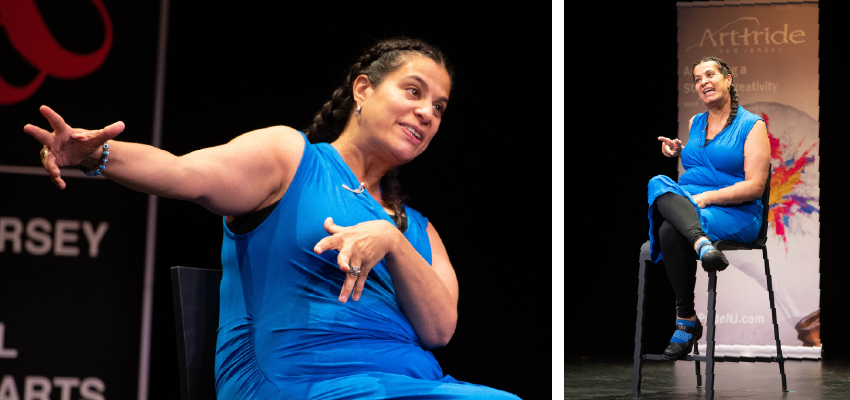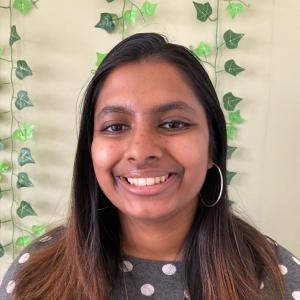The Thrive Arts Conference, presented by ArtPride New Jersey and the New Jersey State Council on the Arts, is a biennial professional development convening for arts administrators throughout New Jersey. At Thrive, experts share ways to best serve and promote the amazing work of arts organizations and how to adapt to daily challenges including the pandemic. The event took place at the Princeton University campus on June 16, 2022.
This year’s keynote speaker was Maysoon Zayid, an Arabian Muslim American comedian, actress, author, disability justice activist, and Princeton University Arts Fellow, who also has cerebral palsy.
As an actress, Zayid points out problematic disability representations on film and on stage, and has accomplished many things throughout her career, including performing for celebrities like Muhammad Ali. Her TED talk notes that performance as the best moment of her career. Zayid also played Zahra Amir on General Hospital.
I, Shefali Sahay, am a DIAL intern working with ArtPride New Jersey. The Diversity in Arts Leadership program is sponsored by Americans for the Arts and the New Jersey State Council on the Arts. I also specialize in advocating for disability justice through my account @weneeddisabilityjustice. I am a rising senior at Mason Gross School of the Arts at Rutgers University in New Brunswick, majoring in visual arts, and did a TEDx Talk in which I told the story of my experiences as a Disabled person.
Maysoon and I share a passion for disability justice. We feel like the arts can play a role in building awareness about disability justice by helping to communicate our thoughts and feelings to the world. She communicates various disability justice issues through her writing, public speaking, and comedy. I communicate through infographic posts. Our work helps our audiences to have better attitudes toward disabled people and to fight for their needs.
SS: What made you want to become an actress on a soap opera and a comedian?
MZ: My parents did not monitor our TV watching, so I was watching soap operas from the age of five. I grew up in a time where there were only five channels, and everybody watched soap operas. I don't know exactly what made me want to be on one. I think it might be because anytime someone ends up in a wheelchair on a soap opera, they get miraculously healed by love... So maybe that's what attracted me. It took me three decades to get on General Hospital, but I made that dream come true! I became a comedian because when I started auditioning to be a soap star, I realized that people on TV did not look like me — a multiple minority, disabled, fluffy woman. In the world of comedy, I did see myself. I saw comedians like Richard Pryor who later in life was a wheelchair user and shook just like me. I took a class at Caroline's Comedy Club, and I found out that I was much better at being funny than being a drama queen. I got my first paid gig three days after my first show.
 SS: I also know that you’ve performed for Muhammad Ali. Could you tell me more about it? What were your favorite dance moves that you did? Where was the performance? Do you have videos of you performing for Ali?
SS: I also know that you’ve performed for Muhammad Ali. Could you tell me more about it? What were your favorite dance moves that you did? Where was the performance? Do you have videos of you performing for Ali?
MZ: Muhammad Ali was being honored at the Khalil Gibran Awards in 2004, and I was the entertainment! I did a 10-minute comedy set. It was a black-tie event at the Omni Shoreham Hotel in Washington, DC. My dad was with me, which made the night even more extraordinary. After my performance, I got to meet Mr. Ali. As both our hands shook, he said to my father, "Your daughter is very funny." What made this night most magical was the fact that, as a young Muslim growing up in an all-Christian town in New Jersey, I had always looked up to Muhammad Ali and now here I was making “The Greatest” laugh.
SS: What is your advice for disabled people who want to become disability justice advocates?
MZ: Learn as much as you can about your own disability. Never forget that you can only talk about your own experience. It is very important to learn from other people who have different disabilities as well as those that share yours. Finally, you must be aware of your privilege. Sometimes we think, 'I'm disabled, I have no privilege.' But if you can walk, that is a privilege. If you are verbal, that is a privilege. A white disabled person's experience is completely different from a BIPOC disabled person's experience. Being aware of privilege is key to fighting for justice and being a quality ally.
SS: Do you have any future plans?
MZ: Too many to share, so I will stick to the highlights... I have my debut comic book coming out in August 2023. It is called Shiny Misfits, and it is published by Scholastic. We are also going to produce an audiobook version with Audible so that it is accessible for everyone. I am working on a docuseries called Welcome to the DisCo with the award-winning director of Crip Camp, Nicole Newnham. So stay tuned for that! The fifth season of my web series, Advice You Don't Want to Hear, will drop on Labor Day weekend. And I am working on a Muslim Christmas movie because I am a Christmas-loving Muslim. I mean, Jesus was born in my neighborhood! My fellowship at Princeton University continues, and the New York Arab American Comedy Festival is celebrating its 19th anniversary in November. Finally, I am learning how to communicate with cats. I will keep you posted.
SS: What could New Jersey do to give justice to disabled people living in the state?
MZ: They could fix the roads first of all! There is not a street that I can cross in this entire state that isn't just one big pothole. New Jersey is doing better than some other states in our Union, but we can always do more. I would like to see Governor Murphy follow Gavin Newsom's lead and introduce some form of universal health care. I would love to see fines imposed on businesses that fail to comply with the ADA and a bunch of money dedicated to improving education for disabled students, including those in higher education. Much like every other state in the Union, disabled New Jerseyans face an enormous amount of violence through their encounters with law enforcement, and that needs to change. They do get points for letting us park for free on federal properties, but they lose all those points when they make people with permanent disabilities renew their disabled placard every two years.
SS: Why did you want to become a disability justice advocate?
MZ: I didn't want to become a disability justice advocate. I just wanted to make people laugh and get paid mad cash for it. In 2014, when I did my TED Talk, I became aware of my extreme privilege as a disabled woman. My parents didn't spend day and night on social media talking about what a burden I was. They didn't try to kill me like the oh-too-many disabled people killed by their parents and caretakers who we remember on the Disability Day of Mourning. I wasn't forced to live in poverty so that the U.S. government wouldn't strip me of access to life-saving services. Fifty percent of all Americans killed by law enforcement are disabled. And it seems that 100% of disabled kids are bullied. When I realized the distress that the DisCo was in, I had no choice but to use my platform to fight for our rights.
SS: Do you know anyone else with a disability (relatives, friends, etc.)?
MZ: I am the queen of the DisCo! I know everybody.
Maysoon at Thrive
Links
- New Jersey State Council on the Arts - https://nj.gov/state/njsca/
- Maysoon Zayid - https://maysoon.com/
- Americans for the Arts – https://artsusa.org
- Diversity in Arts Leadership DIAL internship program - https://www.americansforthearts.org/about-americans-for-the-arts/internships/diversity-in-arts-leadership-internship
- Maysoon’s TED talk – https://www.ted.com/talks/maysoon_zayid_i_got_99_problems_palsy_is_just_one?utm_campaign=tedspread&utm_medium=referral&utm_source=tedcomshare
- Shefali’s TEDx talk – https://youtu.be/xiO4wMGlP_0









